Learn Brogramming
Sigh. Your introductory tutorial was going so well, but given the massive gender imbalance among programmers and computer scientist, I don’t think this is the best way to be inclusive…
Sigh. Your introductory tutorial was going so well, but given the massive gender imbalance among programmers and computer scientist, I don’t think this is the best way to be inclusive…
10 PRINT CHR$(205.5+RND(1)); : GOTO 10 has been reviewed in Neural, an excellent long-running magazine, print and online that covers creative computing from digital art and music through hacktivism. The reviews in Neural (which is published in Italy, in Italian and English) are short and to the point; I’m pleased to see that they neuronally grasped the concept of 10 PRINT and appreciated the work that my collaborators and I did on it.
At Tiltfactor, we believe in the wisdom of great design. We believe the right colors, shapes and messages make our lives brighter, our days more fun and the world a better place. That’s why we made these wallpapers; little pieces of fresh visual ethos to get you thinking and keep you playing.
Check out our wallpapers:
Desktop
Mobile
Here’s one of many amazing pages on, not the World Wide Web, but The Worl: http://www.poetryfoundation.org/learning/guide/236558
(You need to install and activate The Deletionist to see it correctly…)
The Internent isn’t just the Web; it’s also telnet, Gopher, email … and the Worl. Here are 500 pages of the Worl that I printed out and mailed today to Kenneth Goldsmith’s exhibit, Printing Out the Internet.
The Worl is accessible to anyone who has a recent Web browser and has installed The Deletionist.
For Immediate Release
Contact: contact@tiltfactor.org
July 17, 2013 (Hanover, NH) – Tiltfactor Laboratory is proud to present a new digital game, POX: Save the Puppies! POX: Save the Puppies is a game developed for our collaborator in Australia, Dr. Mark Kelman BSc BVMS CMAVA (http://www.virbac.com.au). POX: Save the Puppies serves as a reminder that achieving herd immunity is not just important for humans, it’s also extremely valuable for animal populations. Our recent experimental research shows that playing the game gives players food for thought while also promoting an understanding of systems thinking concepts.

Lori Emerson has been running an excellent facility at the University of Colorado at Boulder that is a kindred lab, and an inspiration, to my Trope Tank here at MIT.
This is the Media Archaeology Lab, which has recently launched a new site (with blog) and has also begun (as a lab) to tweet.
We are excited to launch Play Southend, an online game to imagine the future of Southend-On-Sea in the UK, tomorrow at the Village Green arts and music festival! Play Southend draws on open participatory techniques to develop a collective vision of the town created by its communities. In the game, players — of all ages and experiences — take on challenges, such as obstacles and prizes, that are entirely created by community members. Players play over time and the world grows through endless drawings.
… the mouse; the chording keyboard for use with the mouse; the demo; videoconferencing; real-time online collaboration and collaborative editing; the first practical, working hypertext system, which was also a hypermedia system; word processing; dynamic file linking; version control; computer augmentation of human intelligence; and the bootstrapping of human intellectual processes.
Engelbart died on July 2. (Los Angeles Times obituary.)
We are now working on getting together the ELMCIP Project Final Report, which will be published by ELMCIP in cooperation with the Computing Literature Series at West Virginia University Press and will included chapters by all of the principle investigators contributing the project. I recently completed the draft of the ELMCIP Electronic Literature Knowledge Base Project Report, an extensive report detailing the development process, information architecture, and technical platform of the Knowledge Base. I wrote the report with some help and input from Eric Dean Rasmussen, who was a funded researcher on the project for the first year and a half of the development project and served as the Knowledge Base Editor.
After releasing The Deletionist, a project that three collaborators started two years ago, I thought it would be nice to do something smaller-scale – an occasional poem (in HTML and JavaScript) that took me 30 minutes to write during a conference/festival session this morning, and referring to some of the discussion in it: “I Heart E-Poetry.” It’s meant to be read alound, so I suggest at least imagining doing so.
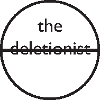 I’m pleased to announce the release of a project that I’ve been working on with Amaranth Borsuk and Jesper Juul for the past two years: The Deletionist. This is a bookmarklet (easily added to the bookmark bar in one’s browser) that automatically creates erasure poetry from any page on the World Wide Web, revealing an alterate mesh of texts called the Worl. Amaranth and I presented The Deletionist for the first time today at E-Poetry in London, at Kingston University.
I’m pleased to announce the release of a project that I’ve been working on with Amaranth Borsuk and Jesper Juul for the past two years: The Deletionist. This is a bookmarklet (easily added to the bookmark bar in one’s browser) that automatically creates erasure poetry from any page on the World Wide Web, revealing an alterate mesh of texts called the Worl. Amaranth and I presented The Deletionist for the first time today at E-Poetry in London, at Kingston University.
I’ve written a chapter for the forthcoming Handbook of Human Computation to be published by Springer New York in winter 2013. I have posted a prepress draft of my chapter “Human Computation in Electronic Literature.”
For Immediate Release
Contact: contact@tiltfactor.org
June 12, 2013 (Hanover, NH) – Tiltfactor Laboratory is thrilled to bring the popular game brainstorming tool, Grow-A-Game, to iPhone and iPad! Developed as part of the Values at Play project, the Grow-A-Game cards are widely used in both K-12 and University classrooms. Using Grow-A-Game, groups of people brainstorm novel game ideas which prioritize human values. While no prior game design experience is necessary, both experienced designers and those new to the field will have fun making games.
Two online emulator initiatives I found out about at the Library of Congress recently, at the Preserving.exe Summit:
The Olive Executable Archive, which originated at CMU and which is not open to the public yet, provides Linux VMs running emulators via one’s browser. When I saw it demonstrated, I was told it worked only on Linux, but that the team planned to have it working on other platforms soon.
JavaScript MESS, a port of the famous multi-emulator to allow it to run in a browser window. It’s not complete, but some of it is working and the code’s on GitHub. This one is an initiative of Jason Scott’s, with a great deal of work contributed by others.
This past Friday was the second annual Dartmouth at Play event and it was a blast!
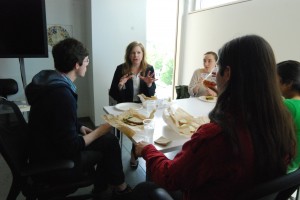
There were great discussions happening all afternoon, and it was enlightening and inspiring to hear alumni panelists talk about games and game design. Topics ranged from the fun, with questions such as, “Tell us of your biggest career success and your biggest failure,” to the serious, “Do games promote violence, or are they unfairly targeted? Has media desensitized the public?” to the practical, “How do you interest players with diverse play styles?”
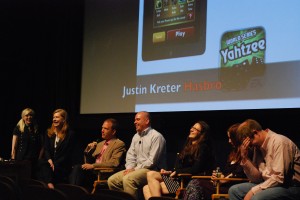
Although the &NOW AWARDS 2: The Best Innovative Writing may appear at first to be an HTML character entity reference, it’s actually a new book. Arranged back-to-back like Chow Yun-Fat and Danny Lee in The Killer, it offers copious amounts (400 pages) of recent provocative writing in various genres. It’s published by Lake Forest College Press.
I’m delighted to have my work in the good company of that by many excellent writers, including J.R. Carpenter, Craig Dworkin, and Michael Leong. My contribution to the volume is just a page each of output from the Latin and Cyrillic versions of “Letterformed Terrain,” from Concrete Perl.
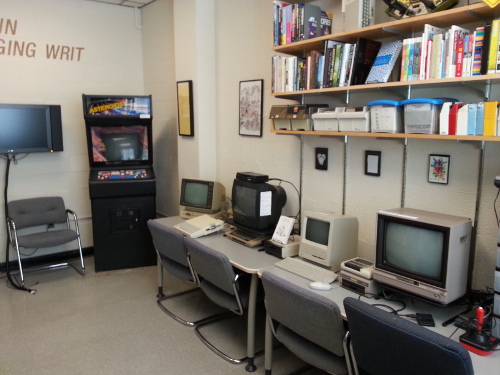
I direct a lab at MIT called The Trope Tank. This is a lab for research, teaching, and creative production, located in building 14 (where the Hayden Library is also housed), in room 14N-233. Its mission is to develop new poetic practices and new understandings of digital media by focusing on the material, formal, and historical aspects of computation and language.
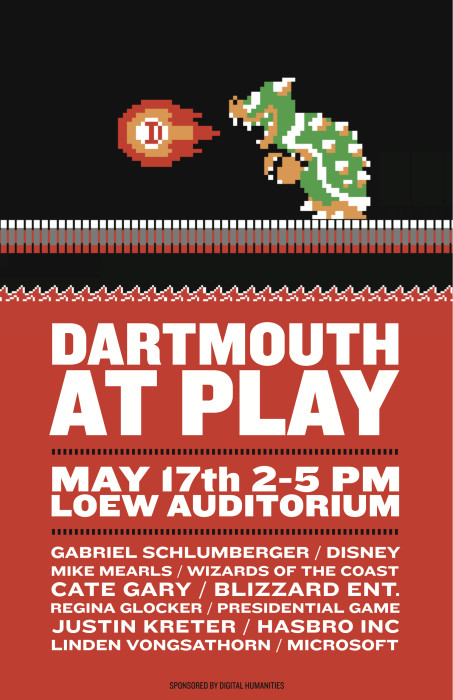
DARTMOUTH AT PLAY
FRIDAY MAY 17
Loew Auditorium 2 – 5 PM
GABRIEL SCHLUMBERGER DISNEY · MIKE MEARLS WIZARDS OF THE COAST · CATE GARY BLIZZARD ENT. · REGINA GLOCKER PRESIDENTIAL GAME · JUSTIN KRETER HASBRO INC · LINDEN VONGSATHORN MICROSOFT
Tiltfactor is pleased to announce our second annual Dartmouth at Play event!
What miracle is this? This giant tree.
It stands ten thousand feet high
But doesn’t reach the ground. Still it stands.
Its roots must hold the sky.
O
HYMEN! O hymenee!
Why do you tantalize me thus?
O why sting me for a swift moment only?
Why can you not continue? O why do you now cease?
Is it because, if you continued beyond the swift moment, you would soon certainly kill me?
[This “House of Leaves of Grass” is a 24K poetry generator that produces about 100 trillion stanzas. Vast, it contains multitudes; it is bigger on the inside than it is on the outside. By Mark Sample, based on “Sea and Spar Between.”]
Members of the Tiltfactor team attended the American Educational Research Association (AERA) Annual Meeting in San Francisco and presented research on games designed for our BIAS project!
Geoff introduced our work by discussing the goals of our lab and the theories behind our BIAS research. We then talked about our games Awkward Moment and buffalo and played a few rounds of each game with the audience. The attendees were receptive of our games and eagerly joined in to play! Geoff finished our discussion by presenting data to show that our games can help players think of themselves and others in ways that reduce the effects of implicit bias. The audience seemed particularly interested that we presented evidence of some transformation in players’ thinking – we love evidence-based research, too! We had a wonderful and engaged audience and thank them for attending our session and for their thoughtful questions about our work.
Well, this time they did. And a Canadian one at that.
This week is the Digital Arts Exhibition at Dartmouth! All week long FAB(rication) Lab has been going on in the Hopkins center with students and visitors learning about programming, animation, and many other subjects that combine art and technology!
Tomorrow (Thursday, May 9th) from 7pm to 10pm in the Black Family Visual Arts Center will be the Digital Arts Exhibition with interactive installations, games to play, and student artwork! There will be food from Salt Hill Pub. There will be a student animation showing at 7:30pm and student live action showing at 9:00pm.
At UC Santa Cruz we’re launching a new professional MS in Games and Playable Media, which will be offered through our Silicon Valley campus and will include working both with our current game faculty and with new personnel hired specifically for the program. We are currently in the selection process for the first position to be hired, the Creative Director. Simultaneously, the job ad is now live for the Program Director. For this newly-opened position we’re seeking someone with demonstrated leadership in the games and playable media field. Application review begins May 29, 2013. The job includes program and curriculum vision, planning, management, and evaluation; teaching and advising students in the program; and ongoing professional work and/or research in the games field. Those who have already applied to the Creative Director position are encouraged to also apply for the Program Director position, if appropriate.
The first ever “Different Games” conference in 2013 was a resounding success. What a receptive community and the organizers, presenters, and attendees were all passionate, smart, and offered so much as game designers, writers, and researchers. I’ve never been to a conference that started off by following an inclusiveness statement, and now that I have, I think it is a great idea to get folks on the same page and open for what is to come. I sat in on the Queering Games panel run by Naomi Clark and Riley MacLeod; then went to the Twine workshop and read great IF/games by the Twine community. After that, there was a tremendous modding exercise of Awkward Moment where huge groups make their own in order to provoke discussion.
Powered by WordPress